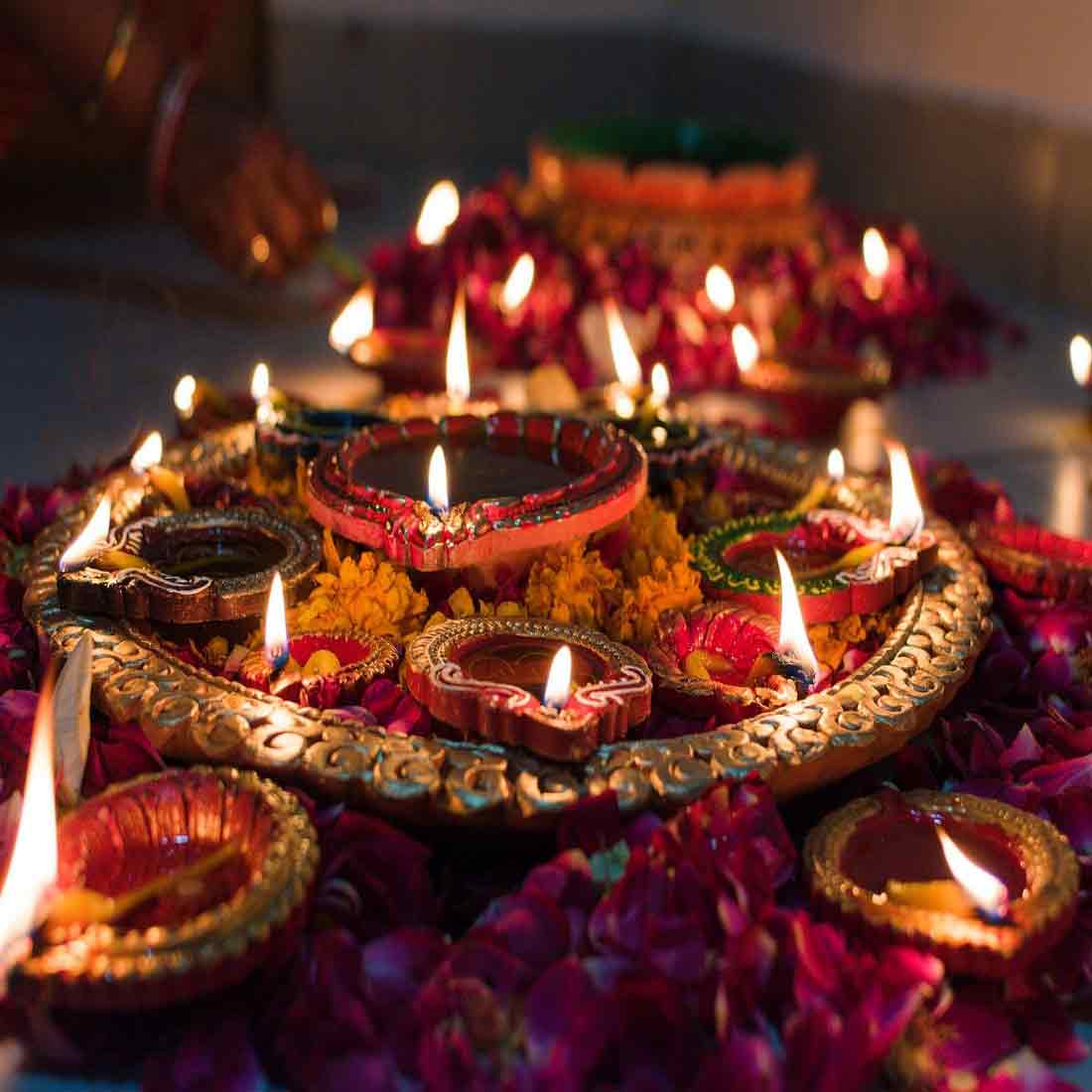Diwali is one of the grandest festivals of India. It is one of those rare celebrations which are observed by multiple religious communities at the same time. Hindus, Buddhists, and Jains – all celebrate the auspicious occasion of Diwali, although they call it by different names and have separate rituals.
Derived from the Sanskrit word ‘Deepawali’ which means ‘rows of lighted lamps’, this occasion is celebrated in the Lunar month of Karthika and traditionally lasts for 5 days. For most parts of Northern India, Diwali is associated with Goddess Lakshmi, the harbinger of wellness and prosperity. But in several other areas, regional traditions connect the festival to deities like Durga, Kali, Dhanwantari, Vishnu, Rama-Sita, and Vishwakarma.
History and significance of Diwali
The existence of a festival named Deepavali can be found as early as in the 1st millennium CE in Sanskrit texts. In the 7th century Sanskrit play Nagananda, King Harsha mentions the Festival of Lights where newly-wedded couples were presented with heaps of gifts. The late 8th century poet Rajasekhara also refers to a festival where houses were cleaned and whitewashed before the arrival of the occasion and on the day diyas were lit all over the kingdom, just like we do on Diwali.
Among the explorers, the 11th-century Persian historian Al-Biruni, 15th-century Venetian merchant Niccolò de' Conti, and 16th-century Portuguese traveler Domingo Paes has referred to Diwali as a traditional occasion where lights are lit all-over the streets, markets, temples and houses.
The significance of Diwali varies from one community to other. But at its core, the festival is about the victory of good over evil, of light over darkness, and knowledge over ignorance.
Some Lesser Known Stories around Diwali
- The Ramayana story
According to the Hindu epic, The Ramayana, Diwali marks Lord Rama’s return to his hometown of Ayodhya after his victory over Ravana.
He and his brother Laxman rescued Sita from Lankapuri and returned to his kingdom after the end of his 14-year long exile. The citizens of Ayodhya were overjoyed at their return.But as it was a night of Amavasya (new moon),there was darkness everywhere. The villagers lit up the whole kingdom with lampsto celebrate the homecoming of their king. Hence from then onwards this day is celebrated as Diwali to symbolize the victory of light over darkness just like Rama's virtue won over Ravana’s sin.
- NarakaChaturdashi
Lord Vishnu, reincarnated as Krishna, once killed a demonnamed Narakasura. He was the son of Bhudevi, Goddess of earth, and Varaha, another reincarnation of Vishnu. He was also the king of Pragjyotishapura. During his birth, his mother sought a boon from Vishnu that their son would be all-powerful and live a long life. Her wish was granted, but Narakasura grew up to be an evil force for the world, enslaving thousands of women and raining torture on humans.
Before his death in the hands of Krishna,Narakasura asked for a boon that his assassination will be celebrated with full festivities. Hencethe day before Diwali is celebrated as NarakaChaturdashi to commemorate the death of Naraka and the freedom of 16000 women, whom Krishna freed and later married to give dignity and social recognition.
- Nirvana of Mahavira
As per ancient Jain texts, Mahavira, the twenty-fourth and lastJain Tirthankara, attained salvation on the day of Diwali. So the believers of Jainismcelebrate “Mahavira Nirvana Divas” along with Diwalito acknowledgethe moksh-praptiof Mahavira’s soul, whichthey believe to be Siddha – the purest form of soul.
- Coronation of King Vikramaditya
The day of Diwali is also known as Varshapratipada or Padwa as the great emperor Vikramaditya of Ujjain was coroneted on this day. He defeated the Saka rulers in 56BCE and initiated the Vikram Samvet calendar in 57BCE.Vikramaditya is known as one of the greatest kings of India, famous for his valour, bravery, wisdom, and leadership.
- Liberation of Goddess Lakshmi
King Mahabali, a powerful but tyrannical ruler on earth, captured Goddess Lakshmi after defeating all the men and gods.Vishnu appeared in his court as Vaman, his fifth avatar, and showed Mahabali the wrongs in his ways with a simple trick of wisdom. Bali willingly surrendered to Vaman, who sent him to the netherworld and liberated his beloved consort from the grasps of evil. This is one of the reasons why Goddess Lakshmi is worshipped on this day.
- Homecoming of Pandasz
Mahabharata has a homecoming story similar to that of Ramayana, when the Pandavas returned to Hastinapur after 13 years of exile. The people of the kingdom, who all loved the Pandavas, arranged for a grand welcome with lights, lamps, and candles all-over the kingdom. It is believed that this day coincides with the occasion of Diwali every year.
On this day, every devotee celebrates by lighting up earthen lamps and candles, and placing them on thresholds, balconies, terraces, windows sills, and every open area of the house as a symbol of ‘triumph of light over darkness’ or ‘good over evil’. The entire country fills up with lights in every nook and corner to commemorate the beautiful The Festival of Lights.

